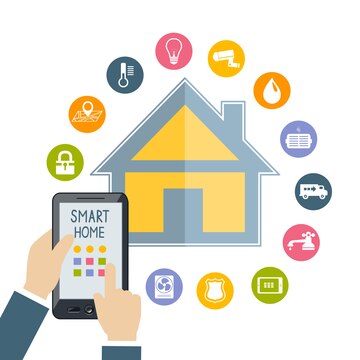The nitty-gritty of home automation security systems
Back in the day, people could only find security systems in significant business premises. Now, security systems are in all kinds of rooms. As long as the room holds someone's valuables, you'll most likely find some security system.
Almost every home now has a security system put in place. This prevalence of home automation security systems is responsible for the rise of automated security systems. These intelligent security systems allow homeowners to control, monitor, and program their surroundings.
Users can keep an eye on their home through the system's dashboard or even from a remote location. All this is possible because these systems can operate via a wireless network.

Innovative home security system manufacturers increasingly equip these systems with mobile-friendly apps. All to make it easy for a user to access and operate the security systems.
Components of home automation security systems
The following are some of the most common automated security systems found in most homes today:
1.CO (carbon monoxide) detectorsAs the name suggests, these detectors will notify their users if carbon monoxide is present in a room. This detector is important because CO is colorless, tasteless, odorless, and deadly.
2.Smoke detectorsSmoke detectors are as common in homes nowadays as they are in business establishments. They are so common now that users can install the devices themselves. What's more, automated smoke detectors have speak alerts. Speak alerts are great, more so for homes with visually impaired dwellers.
3.Window and door sensorsThese are also quite common as they alert homeowners when a window or door is opened. These sensors come in two, having one placed at the entrance and the other at the window. A circuit will break when someone tries to open the door, automatically triggering a text alert or burglar alarm. While this technology has been around for a while, it still works perfectly well.
4.Broken glass sensorBreaking-glass detectors are built to detect the sound frequency made by shattering glass. If the sound is detected, an alarm is set off, notifying users of the break-in. These sensors are typically small and placed near windows or indoors near the glass. They are inexpensive, thus being an excellent security investment.
5.Outdoor and Indoor camerasThese cameras are used in different parts of the home and can record the happenings then send that feed to the user's tablet or smartphone. Cameras are also now made for other parts of the house—for example, Nest and doorbell cameras store footage safely on the cloud.
Is your home automation security system spying on you?
Home security systems aren't as secure as they may lead one to believe. As such, hackers could use them to spy on you. However, when the systems are installed accurately, users could be kept safe from external eyes. Here's how:
- Go over the terms and conditions: Reading the terms and conditions isn't easy, but it will save you a lifetime of insecurity when understood. It is there where all the information on which data is collected is listed. That way, you will know the extent to which the system's manufacturing company is granted access to the device.
- No slacking on software updates: Software updates help manufacturers repair any security holes discovered. So, when you don't update the software, your security systems will be vulnerable to hacking.
- Keep your network secured: Securing your network keeps hackers at bay. Settle for the most robust networks setup available. Usually, it's the WPA-2 configuration as it protects passwords and encrypts the connection. For an extra protection layer, you could ass multi-factor identification. This multi-factor identification will ensure that your password isn't compromised.
- Avoid skimping when shopping: When shopping for a Home Automation security system, getting a well-known brand is always advisable. Such companies usually have excellent security measures, hence the 5-star reviews. Going for less-known brands doesn't mean your data isn't safe. However, the chances are that the protection measures aren't as fool-proof.
Conclusion
There are many other ways you could ensure that your home is safe from intruders when using home security systems. For instance, try changing passwords often (including the routers), checking the camera's IP logs, and switching the default ports.
Manufacturers built home automated security systems to keep their users' homes safe round-the-clock. Automating your home's security comes with many advantages. When you put the above-listed measures into play, insecurity will be a thing of the past.
The best part is that anyone can upgrade your home's security system to match modern security breaches.